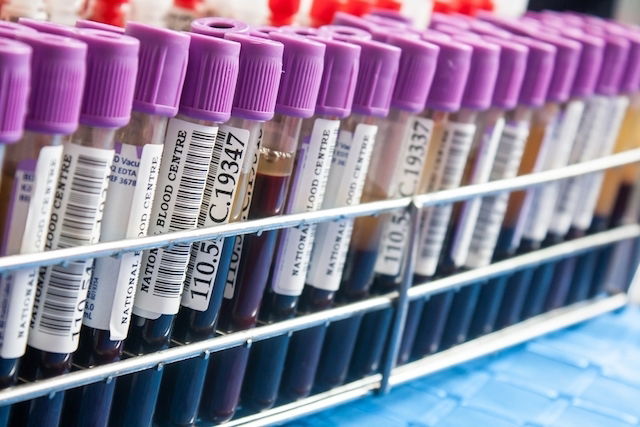What is it:
The FSH blood test evaluate the follicle-stimulating hormone levels, which is produced by the pituitary gland. FSH is responsible for regulating spermatozoa production and egg maturation during childbearing years.
FSH is hormone that is associated with fertility. An FSH blood test can help to identify whether the testicles and ovaries are functioning normally.
Normal FSH levels depend on the patient’s age and sex. In women, FSH levels can also vary depending on the phase of the menstrual cycle, and it can also be a tool used to confirm menopause.

Normal FSH levels
Generally, normal FSH levels are as follows:
- Children: up to 2.5 mIU/ml
- Adult men: 1.4 - 13.8 mIU/mL
- Adult women in follicular phase: 3.4 - 21.6 mIU/mL;
- Adult women in ovulation phase: 5.0 - 20.8 mIU/ml;
- Adult women in luteal phase: 1.1 - 14.0 mIU/ml;
- Women in menopause: 23.0 - 150.5 mIU/ml.
FSH levels vary depending on age and sex. In babies and children, FSH is either non-detectable or detectable at very low levels. It is normal for FSH production to boost during puberty .
Normally, FSH blood tests are not ordered during pregnancy, as levels will fluctuate during this time due to hormonal changes.
Reference values may vary from lab to lab, and therefore doctors should evaluate each lab’s reference ranges.
Abnormal FSH levels
De acordo com o resultado do exame o médico indicar o que está causando o aumento ou a diminuição desse hormônio, levando em consideração a idade, e se é homem ou mulher, mas as causas mais comuns deste tipo de alteração são:
High FSH
In women, a high FSH level may be related to a decrease in ovarian function prior to 40 years of age, post-menopause, Klinefelter’s syndrome, and progesterone or estrogen medications.
In men, high FSH levels may be related to a decrease in testicular function, castration, increased testosterone levels, Klinefelter‘s syndrome, testosterone use, chemotherapy and alcoholism.
Low FSH
Low FSH in women may be a sign of the ovaries not producing eggs normally, pregnancy, anorexia nervosa, corticosteroid use and birth control use.
Low FSH in men may be related to reduce sperm production, decreased pituitary gland or hypothalamus functioning, stress or low weight.
Why it’s ordered
The FSH test is used for:
- Investigating the underlying cause of an irregular or absent period
- Investigating the underlying cause of early or delayed puberty
- Assessing women who have already entered menopause
- Verifying whether the testicles or ovaries and functioning normally
- Investigating the underlying cause of low sperm count in men
- Verifying whether women are producing eggs
- Evaluating pituitary gland function
- Investigating for the presence of a tumor
The FSH blood test can also be ordered by an endocrinology or gynecologist to evaluate fertility status in couples having difficulty getting pregnant.
How this test is done
The FSH blood test is done by collecting a small blood specimen, which is sent to a laboratory for analysis.
Generally speaking, fasting is not required for this test. However, some medications (like birth control pills, cimetidine, clomiphene and levodopa) may interfere with its result. You should consult your doctor about whether you should discontinue this medication prior to the blood test. You should also communicate any medications you are on to the lab so that they can be taken into consideration when reporting results.
Some tests that use contrast, like thyroid scans, may interfere with test results, and therefore any recent tests should be communicated to the lab.






























